15 Jazz Albums for Musicians
Here are 15 jazz albums for musicians to study. They would be easy candidates for my top 25 list but they aren't quite as popular and famous. Nonetheless, they are masterpieces and I try to explain what I find great about them and what I've learned from them here...
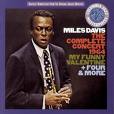
Miles Davis - "Four" & More - Miles Davis
This recording is truly one of those albums you can listen to 50, 100, even 1000 times and hear something new every time. The band connects at such a high level, transitioning from texture to texture seamlessly. The solos are inventive, passionate, and complex, yet simple and swinging. You can listen to the whole album focusing on every single musician, such as Ron Carter's bass lines or Tony William's ride cymbal (he was only 19 years old at the time!). It was the biggest concert of Herbie Hancock, Ron Carter, Tony Williams, and George Coleman's lives up to that point in their careers... Carnegie Hall with Miles Davis! The concert is filled with emotion because just before they went on stage to play, Miles informed them that all the profits would be donated to the NAACP and they wouldn't be getting paid. This caused an uproar in the band and I guess all that feeling channeled out through their playing. I have learned so much from this concert: how to interact as a rhythm section, how to play elaborate and interesting solos, how to change rhythms effectively to name a few, and how to be play standards in a hip post-bop style.
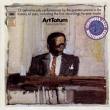
Musicians listening to Art Tatum for the first time usually have a similar reaction: he is so technically, harmonically, and creatively brilliant and nearly perfect that they might as well quit trying to play music because they will never come close to such amazingness. After they settle down and listen again, then they can start to enjoy how advanced Art Tatum was for his time. Even the best classical pianists were amazed at his flawless technique, each hand was doing impossible feats and often in counterpoint of each other. His chords are still ahead of our time in many ways and are dissected by bebop and post-bop even to this day. I recommend him to all jazz musicians and this compilation is a great place to start.
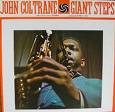
Giant Steps seems to be the most cliche song to learn for a jazz musician who officially wants to enter the "big leagues" of jazz. This is because it's a really fun, but difficult, song and Coltrane's three-tonic system sounds so hip. The other songs on the album are great too. Countdown showcases some of the fastest, cleanest sax playing ever recorded. So if you are a musician, learn Giant Steps and feel accomplished (then learn Countdown to get another boost of confidence). If you are just a listener, then relax and enjoy some brilliant, sophisticated jazz.
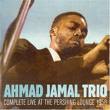
Ahmad Jamal At the Pershing - But Not for Me - Ahmad Jamal
Ahmad Jamal exhibits so much self-control. He plays varying textures and often doesn't play at all for measures at a time to show off his swinging rhythm section. I saw him live for the first time a few years ago and was amazed at how much he would get up and tell his band to quiet down, speed up, etc. Ahmad had a big influence on Miles Davis because if you play fewer notes, what you play has more of an impact. This album is simply magical, it has the famous "Poinciana" which alone is a unique and beautiful composition. It also has the tune, "No Greater Love" which I used to despise because I thought it was cheesy but after hearing Ahmad Jamal play it, it's one of my favorites.
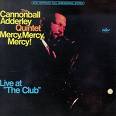
Mercy, Mercy, Mercy - Live at 'The Club' - Cannonball Adderley Quintet
This album could easily be on my top 25 albums of all-time list. It's fun, happy, and yet full of very heavy, intense jazz. The song "Mercy, Mercy, Mercy" is a must for any beginner musician (you probably played in your first school jazz band right?). I teach it to both my piano and saxophone students but rediscovered it for myself in the process. I love the facade of this recording too: it says that it is "Live at the IT Club" but they just brought a bunch of their friends into the studio and gave them drinks to make it sound that way. Check out the song "Hippodelphia" to hear an amazingly swinging song with some balls-to-the-wall sax playing; I love Cannonball's growl in his tone.
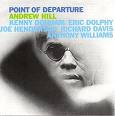
Point of Departure - Andrew Hill
Alright, I think Andrew Hill is one of the most amazing and underrated jazz musicians. He recently passed away a couple of years ago and I got a chance to meet his wife and told her how much his music meant to me, it was very special to me and I hope his music starts to get the recognition it deserves now that he is gone. Anyway, this album showcased Andrew's style with an all-star cast of Kenny Dorham, Richard Davis, Joe Henderson, Eric Dolphy, and 19-year-old Tony Williams. Each song is incredibly complex and enlightening. Also, I think Herbie Hancock's lines and shapes were influenced by Andrew Hill. But Andrew has such a strong and unique style that it's great to study but is tough to replicate because it is his own.
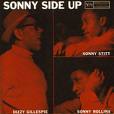
Sonny Side Up - Dizzy Gillespie, Sonny Rollins & Sonny Stitt
This is a great classic jazz album full of burnin' bebop. It starts with the lovely tune, "On the Sunny Side of the Street" which features Dizzy singing. Next is the main event, the notorious "The Eternal Triangle", which is a 15-minute long rhythm changes tune. Sonny Rollins takes the first solo and is a perfect example of a great creative, swinging, fresh bebop. Then Sonny Stitt takes the next solo and it just swings so hard with so much energy. Then they start trading for like 4 minutes coming up with idea after idea (I think Sonny Stitt gets cut big time). After 9 minutes of solos by the young tenor players, Dizzy comes in and is like "I helped invent this style and THIS is how it's played." Dizzy just lays down his lines and it's obvious he'd been playing them for many years because they are so lyrical and he can bring up the intensity at any point with ease.
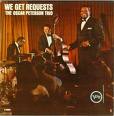
We Get Requests - Oscar Peterson Trio
This was one of my first jazz albums and I must admit that I didn't completely understand jazz when I was 12 like I do now, but what I did know was that this album was some of the nicest music I had ever heard up to that point. I must have lost it at some point in high school but late into my college career I got back into it and was amazed at how "perfect" Oscar is on the piano. Every song sets up a mood and develops at the perfect pace. Of course, all the songs swing hard with the help of Ray Brown and Ed Thigpen. Eventually, I learned a couple of the solos (Days of Wine and Roses and You Look Good to Me) and after playing them I realized Oscar is one of the best pianists to ever live; though he does play licks, he plays them beautifully. The last song, "Goodbye J.D." is a barn burner that I have listened to on repeat for hours at a time thinking, "Now this is how to play fast!"
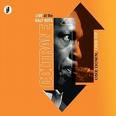
One Down, One Up - Live at the Half Note - John Coltrane
This album was released in 2005 and showcases the post-Love Supreme quartet in their element playing deep, extensive improvisations. The first song is a half hour long and Coltrane is relentless, he plays full intensity the whole time (listen to him at 9:00 minutes in... crazy!). McCoy drops out half way through the song and it's just Coltrane and Elvin Jones spewing endless ideas. In the next track, "Afro Blue", McCoy Tyner answers with about 7 minutes of extremely intense and fast playing. I love live Coltrane albums and this is up there with the best, a must for any Coltrane fan.
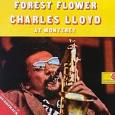
Forest Flower - Live at Monterey - Charles Lloyd Quartet
I first heard this album when my dad got it a few years back and was amazed by the beauty and ferocity of this quartet. Charles Lloyd has a mesmerizing sound that can be relaxing and tranquil or wild and biting. The rest of the quartet is none other than a young Keith Jarrett Trio (Gary Peacock, Jack DeJohnette) and they are wilder than ever in this performance at the Monterey Jazz Festival in 1966. Keith Jarrett takes it OUT like I've never heard him before, almost at the Cecil Taylor level at points. This album was a big success for jazz and non-jazz listeners alike and even penetrated the hippie scene at the time. It's pretty much unlike anything I've heard so check it out sometime.
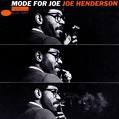
I've learned a lot from this album: how a bass player and drummer should lock in and swing harder than thought possible, what hip and "modern" jazz sounds like, what incredibly interesting and melodic solos are, an example of great recording quality, and small-combo jazz sounds awesome with vibes. The cast is pretty stellar with Joe, Lee Morgan, Curtis Fuller, Bobby Hutcherson, Cedar Walton, Ron Carter, and Joe Chambers and boy does this record just SOUND great! The tunes are so interesting and enjoyable and the solos just keep me tuned in. By the way, Joe Henderson is one of my all-time favorite tenor players because of his unique style with all his trills and stuff, he plays very nice and fresh bebop lines, and his tone is so "earthy" and organic.
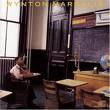
Black Codes (From the Underground) - Wynton Marsalis
As you can probably tell, I love classic jazz very dearly. However, this album from 1985 is some breathtaking music that shows how jazz developed into the next generation of musicians. I must admit that I have some mixed feelings about Wynton as a person which I won't get into here but his musicianship is top-notch. His band is so talented with Jeff "Tain" Watts, Charnette Moffet, his brother Brandford Marsalis, and my favorite pianist of that time, the late Kenny Kirkland. They play intense, complex, and emotionally charged music that swings and sings. Every player has advanced his instrument so much and players today are developing off of what they did.
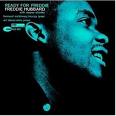
Ready For Freddie - Freddie Hubbard
Jazz musicians need to learn bebop right? Well when Freddie hit the scene with this album at age 24 in 1961, he brought a new approach to the style and just hints at the style he will develop into. He was probably the biggest trumpeter to hit the scene since Clifford Brown. I've always loved the bebop lines that Freddie plays in all of his recordings, but this is an album that is pretty much full of straight-ahead raw bop. However, I do think that Freddie is one of those musicians who gave his all so much that any album of his is nice until he blew his chops mid 70's.
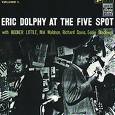
At the Five Spot - Eric Dolphy
This show was a real gem. Eric Dolphy plays some unique and interesting tunes and keeps them fresh with his complex bop lines. This record also features Booker Little who is an equally talented lyrical trumpeter. However, what I've learned the most from this recording is from what Mal Waldron plays on the piano. His playing changed my style, he would just find a nice melody and play it over and over and then change it a little and play it over and over again. So many players are busy and sometimes nonsensical, but Mal just finds something nice and plays it until he's milked everything from it. It's a very useful skill to be able to do.
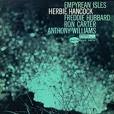
Empyrean Isles - Herbie Hancock
Herbie is my favorite, I have to say it. I love his jazz, his funk, his electronic, and his experimental styles. This album is a quintessential jazz album with Ron Carter, Tony Williams, and Freddie Hubbard. It has "Cantaloupe Island" which is probably one of the coolest songs ever and a must-learn for any pianist. It also has the super-hip, "One Finger Snap" which is one of my favorite songs to jam on. There's endless debate about whether the alternate take is better than the album version. This is because on the alternate take Freddie plays one of the most killing solos I've ever heard and kind of upstages Herbie. Herbie plays much better and meaningful on the album version (probably why he chose it), but that alternate takes swings so hard when Freddie is playing, it makes my head spin!
Back to Jazz Albums
or to The Jazz Resource Home